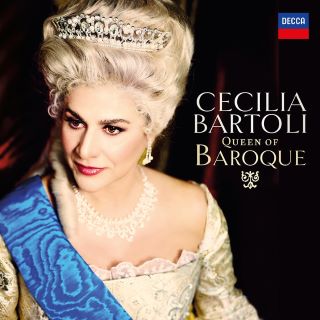YES, QUEEN
OK, it may be a tag line, but I promise you that Cecilia Bartoli IS the “Queen of Baroque.” And this sentiment coming from someone who can take only so many malismas. Her strength and passion are awesome, her diction stunning, her emotion undeniable, and her range seemingly endless. Her first compilation album (pre-order for 1/22/21 release) in a decade features the very best of Bartoli’s recordings of musical delights and discoveries of the 17th and 18th centuries, including two previously unreleased, world premiere recordings of forgotten jewels by Italian composers Leonardo Vinci and Agostino Steffani. There are also special guests Philippe Jaroussky, June Anderson, Franco Fagioli and Sol Gabetta (one of my favorite cellists), sharing her passion for musical curiosities uncovered throughout the centuries.
The Baroque opera was rich with new material and a wide and eager audience. Costume styles evolved, casts changed, newly developed solo instruments were given a spotlight, but the stories explored within the music were reimagined again and again. Structurally, a Baroque opera consisted of arias threaded together by plot-thickening recitatives, resplendent with similes and allegorical vignettes. Arias could be plucked from one production and slotted into another, sometimes to create an opera pasticcio in which a ’˜mega mix’ of popular hits featured in a new context. Rather than being considered plagiarism, this action paid homage to great musicians, and merely prolonged the life of an aria.
Moments of quiet contemplation contrast with the virtuosic: the full extent of the human condition is shared through cooing love duets, coloratura duels, religious fervor, warlike dramatism, moments of despair flirtatious humor and sensational discoveries. Period instruments and historically informed performance practice have played an integral part within her projects and led to the formation of her own orchestra, Les Musiciens du Prince-Monaco, in 2016.
Track List:
- Steffani – I trionfi del fato: “E l’honor stella tiranna”*
- Vinci – Alessandro nelle Indie: “Quanto Invidio’¦Chi vive amante”*
- Handel – Rinaldo: “Lascia ch’io pianga”
- Broschi – Artaserse: “Son Qual Nave”
- Pergolesi – Stabat Mater, P. 77: 1. Stabat Mater dolorosa feat. Anderson
- Vivaldi – Griselda: Agitata da due venti
- Steffani – Niobe, regina di Tebe: “Serena, o mio bel sole’¦ Mia fiamma’¦” feat. Jaroussky
- A. Scarlatti – Il Sedecia, Re di Gerusalemme: “Caldo Sangue”
- Handel – Serse: “Ombra mai fu”
- Albinoni – Il nascimento dell’Aurora: “Aure andate e baciate” feat. Sol Gabetta
- Graun – Adriano In Siria: Deh, tu bel Dio d’amore’¦Ov’e il mio bene?
- Steffani – Stabat Mater: “Eja Mater, fons amoris’¦ Fac, ut ardeat’¦ Sancta Mater’¦ Tui nati, vulnerati” feat. Fagioli, Behle
- Caldara – Il Trionfo dell’Innocenza: “Vanne pentita a piangere”
- Handel – La Resurrezione (1708), HWV 47: “Disserratevi oh porte d’Averno”
- Porpora – Germanico in Germania: Parto ti lascio, o cara
- Steffani – I Triondi del fato: “Combatton quest’alma” feat. Jaroussky
- Handel – Rinaldo: “Bel piacere”
*Denotes a world premiere recording

